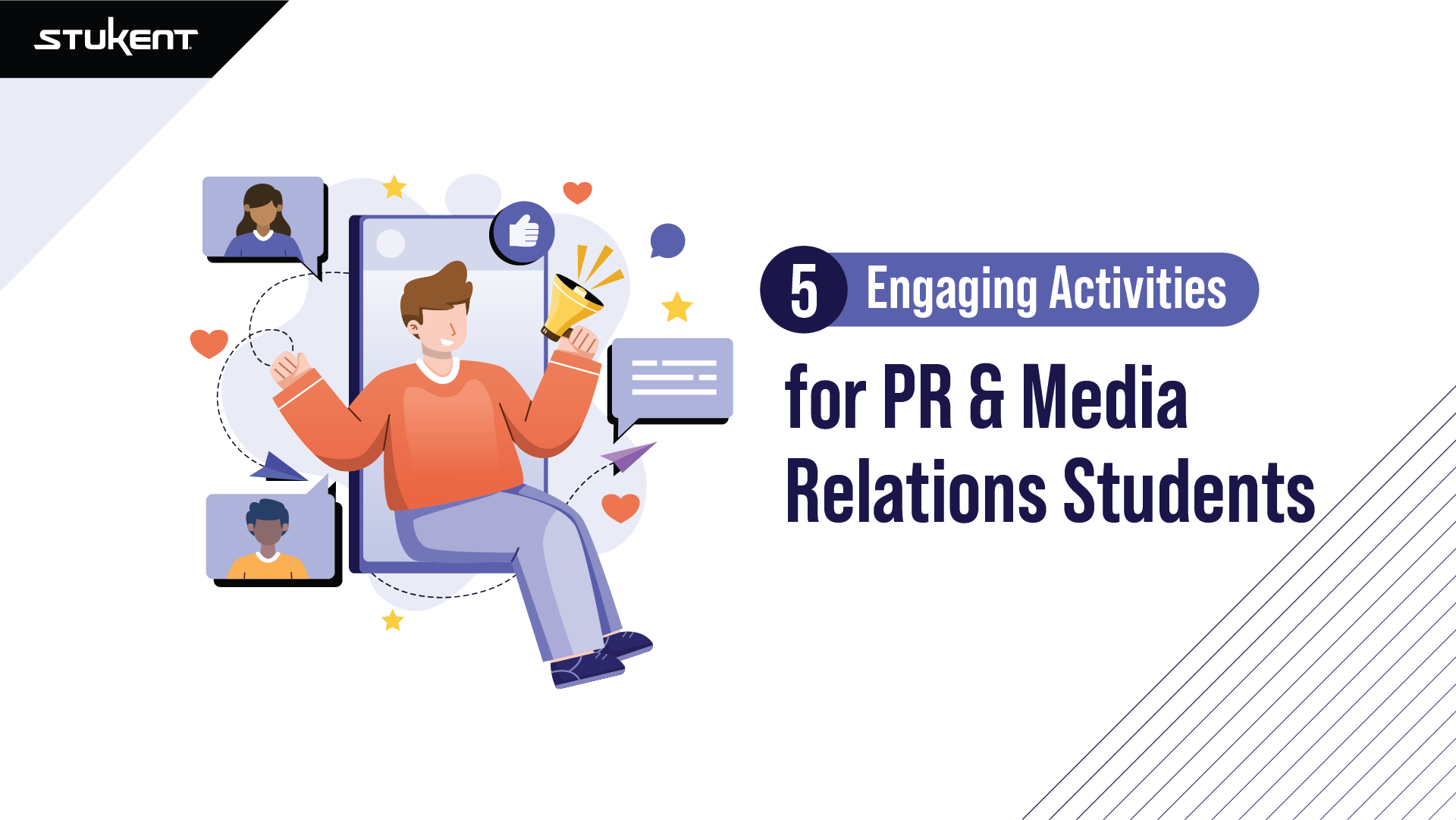Engaging students in media relations and public relations (PR) courses can be challenging but immensely rewarding. Real-world examples and hands-on activities make these subjects come alive, helping students understand and apply key concepts effectively.
Here are five activities that can be conducted both in class and online to boost student engagement and learning.
1. Media Kit Workshop
A media kit is a critical tool for any PR professional. It provides journalists with essential information about a company or event, making it easier to secure media coverage. Learning to create a media kit helps students develop the ability to present information clearly and professionally.
Before starting this activity, show your students examples of media kits. Brands like Hinge, Crumbl, and Airbnb have impressive kits.
Activity Details
Divide students into small groups and assign each group a fictitious company. Here are some examples:
EcoTech Innovations: A startup specializing in eco-friendly technology solutions.
Gourmet Bliss: An artisanal food brand launching a new line of organic snacks.
FitLife Gear: A fitness apparel company promoting a new sustainable product line.
Each group is tasked with creating a comprehensive media kit, including:
- Press release
- Company background
- Executive bios
- Product/service details
- High-quality images
Resources: Canva for design templates, Google Docs for collaboration
2. Press Release Writing and Pitching
Crafting a compelling press release and pitching it effectively are core skills for PR professionals. These tasks require clear, concise writing and the ability to tailor messages to specific audiences.
Before starting this activity, ask your students to review press releases from PR Newswire to see professional standards.
Activity Details
Have students write a press release for a current event or product launch for their assigned fictitious company (e.g., EcoTech Innovations launching a new solar-powered gadget). Then, organize a role-playing session where students pitch their press releases to classmates acting as journalists.
Online Component: Use a discussion board for students to post their press releases and receive peer feedback.
Resources: AP Stylebook or Purdue Owl for press release formatting, Google Forms for peer feedback
3. Brewing Success in Crisis: Learning to Rebuild Stakeholder Trust
In the face of a crisis, the ability to communicate effectively can protect a company’s reputation and maintain public trust. This skill is essential for PR professionals who must navigate complex situations and deliver clear, honest messages under pressure.
Before starting this activity, ask your students to analyze the crisis communication strategies of companies such as OpenAI firing their CEO, Twitter turning into X, or Pepsi’s controversial advertisement.
Activity Details
Download the “Brewing Success in Crisis” assignment.
In this assignment, students will engage in a crisis scenario from a fictional company called Mighty Brew. The purpose of this assignment is to provide students with a practical opportunity to apply crisis communication strategies, tactics, and skills in a real-time, interactive setting. Students will learn how to analyze, strategize, and respond effectively to an ongoing crisis while considering various stakeholders, media channels, and communication tools.
Here is the scenario presented: Mighty Brew is an alcoholic beverage company that appeals to men aged 21-35 who enjoy sports, humor, and socializing. The company recently launched a campaign that did not align with its target audience. Company stocks have plummeted, partnerships with retailers and sports teams are renegotiating their Mighty Brew contracts and trying to take them out of stores, and Mighty Brew customers are boycotting the brand and posting their disappointment on social media.
Resources: Download the PDF of the assignment here.
4. Media Analysis and Ethics Debate
Ethical considerations are paramount in PR. Developing the ability to analyze media content critically helps students identify ethical issues and navigate them professionally.
Before starting this activity, consider discussing the ethical challenges faced by companies like Volkswagen during the emissions scandal.
Activity Details
Provide students with different news articles, press releases, and media statements. Have them analyze the content for bias, ethical considerations, and effectiveness for their fictitious companies.
Online Component: Host a discussion board where students post their analyses and debate ethical dilemmas in PR.
5. PR Scavenger Hunt
Knowing how to find and use media contacts is essential for PR professionals. This activity engages students in research and builds their knowledge of key media outlets and influencers.
Using examples from successful PR campaigns, discuss the importance of tailored media lists and the value of building relationships with key journalists before starting the activity.
Activity Details
Create a scavenger hunt where students must find specific types of information related to media outlets and journalists. For example:
- Find the contact information for a journalist who covers technology at a major newspaper.
- Identify three influencers in the fitness industry.
- Locate the submission guidelines for a popular online magazine.
Online Component: Use a shared document on Google Sheets to have students input their findings and collaborate.
Resources: LinkedIn for finding and connecting with journalists, Hunter.io for finding email addresses
Find More Activities and Course Resources in the Stukent PR Suite
Incorporating real-world examples and interactive activities into media relations and PR courses can significantly enhance student engagement and learning. By providing practical, hands-on experiences, educators can help students develop essential skills and prepare them for successful careers in public relations.
The Stukent® PR Suite offers a variety of courseware tailored to different PR courses and career paths:
- PR Principles: For introductory courses, focusing on fundamental principles, integrated campaigns, and strategic messaging
- Public Relations Case Studies: For advanced courses, offering real-life scenarios for hands-on learning
- PR Writing: For intermediate to advanced writing courses, covering legal and ethical considerations, AP style, and persuasive writing
- Crisis Communication: For courses in crisis communication, emphasizing strategic communication practices before, during, and after a crisis
Stukent courseware take the textbook to the next level. They include ready-made lesson plans, lecture slide decks, auto-graded quizzes, Expert Sessions videos, and more.
Plus, you can bundle the “PR Principles” courseware or “Crisis Communication” courseware with a Simternship™, a simulation that allows students to practice the same tasks they might face in their first professional role.
To learn about Stukent’s first-in-the-world Simternships and courseware and to get FREE instructor access to Stukent materials, visit our website.







